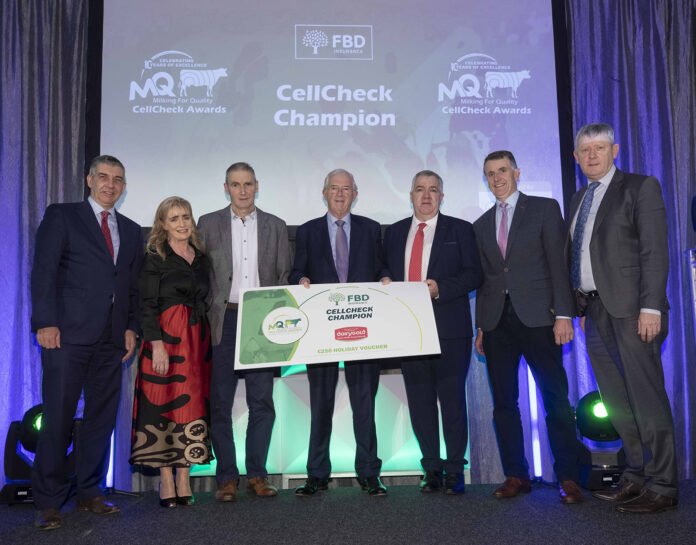
Animal Health Ireland (AHI) hosted its 10th annual CellCheck awards in Killashee Hotel, Naas, Co. Kildare on Friday last. The awards recognise excellence achieved by Irish dairy farmers in herd health, specifically those that achieve a consistently low somatic cell count (SCC) in their dairy herds.
CellCheck is the national mastitis control programme. Coordinated by Animal Health Ireland, the programme works with dairy farmers and their service providers, to increase the awareness and capacity to manage and prevent mastitis in Irish herds. This delivers a healthier and more productive herd, which contributes to increased efficiency and profitability.
Over the last decade, the national average bulk tank SCC has reduced by almost 100,000 cells/mL to the current 183,000 cells/ml. This improvement in udder health in the national herd is also helping to reduce antimicrobial usage, improve farm profitability and contribute towards reducing agri-emissions. A study conducted by AHI found that the average dairy farmer can increase net profitability by at least 1 cent per litre through improved mastitis control.
500 dairy farmers from across the country with the lowest weighted annual average SCC for the previous year’s milk supply attended the FBD sponsored awards as winners. On the night one CellCheck Champion was identified from each of the 18 participating dairy processors.
Locally, champions representing Dairygold were David and Eileen Hannon; the Tirlán champion was Tommy Murphy, the North Cork Creameries Co-op champion was Donald Sweeney, while Sean McCutcheon was the Tipperary Co-op champion.
Presentations were also made this year to 14 recipients from seven Co-ops, who have been winners of the CellCheck ‘Milking for Quality’ awards for each of the last 10 years.
Speaking at the presentation of awards, Minister for Agriculture, Food and the Marine Charlie McConalogue T.D. commended AHI for their vital work on other animal health programmes, including the National BVD Eradication programme, which is nearing a conclusion, and the continued work to prepare options for a national IBR eradication programme.
The Minister added that both he and his officials look forward to continued engagement with AHI and their private sector stakeholders, in order to deliver improved animal health and welfare outcomes for the benefit of the agrifood sector.







